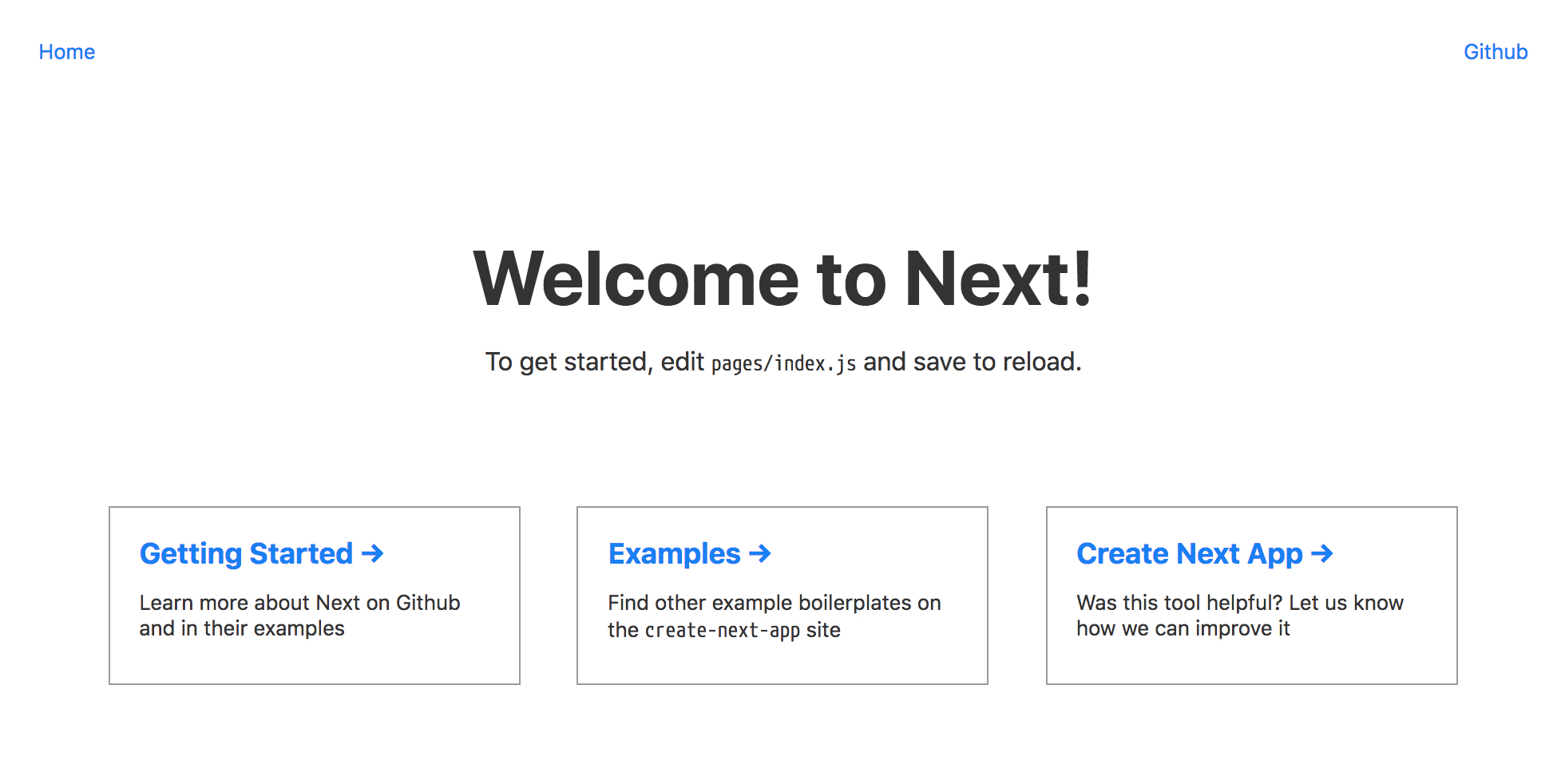next.js 是一个基于 React 的通用 JavaScript 框架,next.js 为 React 组件模型提供了扩展,支持基于服务器的组件渲染 (SSR),同时也支持在客户端继续进行渲染。
本文通过实现一个热门加密货币行情的网站来学习 next.js。
官网 https://github.com/zeit/next.js
本文代码运行环境:
- macOS High Sierra 10.13.3
- Node.js 8.9.4
完整代码 https://github.com/lxzxl/crypto-compare
使用 create-next-app 命令创建项目。
npm i -g create-next-app
create-next-app crypto-compare
cd crypto-compare
npm run dev项目结构:
crypto-compare/
README.md
package.json
next.config.js
components/
index.js
head.js
nav.js
pages/
index.js
static/
favicon.ico
使用插件 next-sass
npm i @zeit/next-sass node-sass使用方法:
样式文件最终会被编译到 .next/static/style.css。必须使用一个自定义的 _document.js 来引导这个样式文件。
// ./pages/_document.js
import Document, { Head, Main, NextScript } from 'next/document';
export default class MyDocument extends Document {
render() {
return (
<html>
<Head>
<link rel="stylesheet" href="/_next/static/style.css" />
</Head>
<body>
<Main />
<NextScript />
</body>
</html>
);
}
}然后修改 next.config.js 让 next 或者说 webpack 支持 scss 文件:
// next.config.js
const withSass = require('@zeit/next-sass');
module.exports = withSass({
webpack: config => {
// Fixes npm packages that depend on `fs` module
config.node = {
fs: 'empty'
};
return config;
}
});现在在我们的页面代码中直接引入需要的 scss 文件即可:
// components/layout.js
import '../static/styles.scss';本项目中我使用 bulma.css 最为基础 css 框架,所以需要在 styles.scss 中引入 bulma.css。
// static/styles.scss
@import '~bulma/css/bulma.css';使用 axios, 原因是 server 端和 client 端都支持。
npm i axios基本工作已经完成,接下来就要专注于功能实现上了。功能基本复制于 https://cn.investing.com/crypto/currencies。数据则来自 开源 API。
明确我们需求:
- 首页 - 显示一个频繁更新的加密货币表格。
- 详细页面 - 用户选择某个货币,显示该货币的价格历史。
因为不止一个页面,我就先写了一个通用的基本布局组件 components/layout.js,其他页面的内容都是这个组件的 props.children。
import '../static/styles.scss';
import Head from './head';
const Fragment = React.Fragment;
const Layout = props => (
<Fragment>
<Head {...props} />
<section className="hero is-primary is-small">
<div className="hero-body">
<div className="container">
<h1 className="title">Crypto Compare</h1>
</div>
</div>
</section>
<section className="section content">
<div className="container">{props.children}</div>
<style jsx>{`
.content {
padding: 3rem 5%;
}
`}</style>
</section>
</Fragment>
);
export default Layout;
首页要显示一个各种货币的价格表。可以先来实现一个单独的货币列表的组件 components/coinList.js:
const List = ({list}) => {
return (
<table className="table is-hoverable is-fullwidth">
<thead>
<tr>
<td>Name</td>
<td>Symbol</td>
<td>Price (USD)</td>
<td>Market Cap</td>
<td>Chg (24H)</td>
</tr>
</thead>
<tbody>
{list.map(({USD}) => (
<tr key={USD.FROMSYMBOL}>
<th>{USD.FROMSYMBOL}</th>
<th>{USD.FROMSYMBOL}</th>
<th>{USD.PRICE}</th>
<th>{USD.MKTCAP}</th>
<th>{USD.CHANGE24HOUR}</th>
</tr>
))}
</tbody>
</table>
);
};
然后是首页页面:
import axios from 'axios';
import {array} from 'prop-types';
import Layout from '../components/layout';
import CoinList from '../components/coinList';
const Index = ({coinList}) => (
<Layout title="Home">
<CoinList list={coinList} />
</Layout>
);
Index.propTypes = {
coinList: array
};
Index.getInitialProps = async ({req}) => {
const {data} = await axios.get('https://min-api.cryptocompare.com/data/pricemultifull', {
params: {
fsyms: 'BTC,ETH,XRP,BCH,LTC,ADA,NEO,XLM,EOS,DASH,IOT,XMR,XEM,ETC,TRX,VEN,LSK,QTUM,BTG,USDT',
tsyms: 'USD'
}
});
const displayData = data.DISPLAY;
return {
coinList: Object.keys(displayData).map(k => displayData[k])
};
};
export default Index;
最开始打算把 getInitialProps 方法放到 coinList.js 组件中,但文档说 getInitialProps 方法只会在 pages 目录下的文件中执行 (*Note: getInitialProps can *not** be used in children components. Only in pages.)
这样,一个粗糙的首页就完成了
但这只是一个很简单的页面,没有定时自动更新数据的功能,接下来我们加上自动更新功能。
因为有自动更新,所以这个页面就应该有自己的状态和生命周期,所以函数组件就不太合适了,需要使用有状态的组件。
import axios from 'axios';
import {Component} from 'react';
import {array} from 'prop-types';
import Layout from '../components/layout';
import CoinList from '../components/coinList';
class Index extends Component {
static async fetchData() {
const {data} = await axios.get('https://min-api.cryptocompare.com/data/pricemultifull', {
params: {
fsyms: 'BTC,ETH,XRP,BCH,LTC,ADA,NEO,XLM,EOS,DASH,IOT,XMR,XEM,ETC,TRX,VEN,LSK,QTUM,BTG,USDT',
tsyms: 'USD'
}
});
const displayData = data.DISPLAY;
return {
coinList: Object.keys(displayData).map(k => displayData[k])
};
}
static async getInitialProps({req}) {
return this.fetchData();
}
constructor(props) {
super(props);
this.state = {coinList: props.coinList};
}
componentDidMount() {
this.timerID = setInterval(async () => {
const newData = await this.constructor.fetchData();
this.setState(newData);
}, 10000);
}
componentWillUnmount() {
clearInterval(this.timerID);
}
render() {
const {coinList} = this.state;
return <Layout title="Home">{coinList && <CoinList list={coinList} />}</Layout>;
}
}
Index.propTypes = {
coinList: array
};
export default Index;
解释一下,我在 componentDidMount hook 中添加了一段每隔 10 秒拉取数据的代码。获得新数据后会 setState 更新组件。这样页面上的数据每隔 10 秒就会更新一次。查看网页源代码可以确认,确实是可以服务端渲染,没毛病。
首先我们要给历史页面一个入口链接,把价格单元格改为链接,并把选中的货币当作参数传给历史页面:
import Link from 'next/link';
...
<th>
<Link href={{ pathname: '/history', query: { symbol} }}>
<a>{price.PRICE}</a>
</Link>
</th>
...
然后在 pages 目录下添加 history.js 文件作为历史页面。因为需要显示不同时间段的价格曲线,所以做一个有状态的组件比较好:
class History extends React.PureComponent {
static async getInitialProps(ctx) {
const {symbol} = ctx.query;
return {history: await fetchCoinHistory(symbol)}
}
constructor(props) {
super(props);
this.state = {
history: props.history
};
}
render(){
<Layout title="History">
<CoinHistory data={history} />
</Layout>
}
}
同样,我们在 getInitialProps 中拿到当前货币,然后调用 API 获取历史价格,传递给 CoinHistory 组件渲染出来。图标是用 chart.js 画的,无须多说。
最终的效果就是:
为了能返回首页,可以把 H1 改为到首页的链接:
<h1 className="title">
<Link href={'/'}><a>Crypto Compare</a></Link>
</h1>
这样,一个基本的加密货币价格网站就可以使用的,如果有兴趣的话,可以加入一些其他功能,比如价格升降的不同样式,高亮有变化价格等等。。


